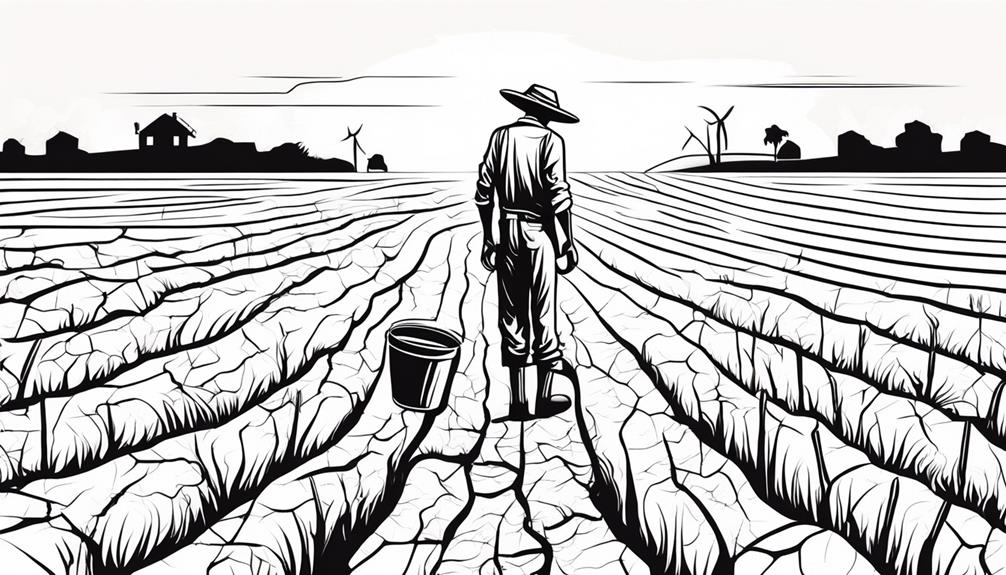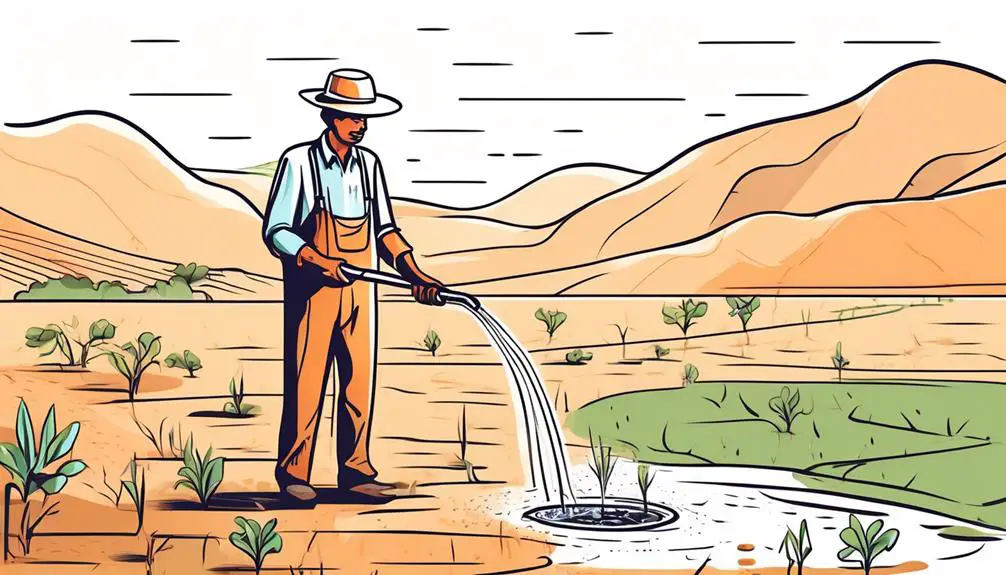Imagine being a farmer tending to your crops under the scorching sun, facing the daunting challenge of water scarcity and its implications on your agricultural practices.
The availability of water is a fundamental factor in ensuring successful crop yields, yet with the growing pressures of water scarcity, the future of farming hangs in the balance.
As you navigate through this complex landscape, exploring the intricate relationship between water resources and agriculture, you begin to grasp the critical nature of finding sustainable solutions to safeguard both your livelihood and the environment.
Key Takeaways
- Reduced crop yields due to insufficient water supply
- Increased reliance on groundwater leading to depletion
- Shift in planting seasons to cope with water scarcity
- Limited agricultural expansion and productivity growth
Water Scarcity's Influence on Crop Production
Efficiently managing water resources is essential for optimizing crop production in regions facing water scarcity. Water scarcity directly impacts crop production by limiting water availability for irrigation, a crucial component for agricultural practices.
With global food security at stake due to climate change-induced water stress, efficient water management becomes paramount. In water-scarce regions, reevaluating crop choices to favor those requiring less water can help maximize yields while conserving this precious resource.
Moreover, implementing advanced irrigation techniques is key to sustainably enhancing crop production under water scarcity conditions. Even rainfed agriculture can benefit from strategic water management practices to mitigate the risks posed by water scarcity on crop yields.
Effects of Water Shortage on Farming Techniques
When water is scarce on your farm, you face challenges with irrigation techniques that directly impact your crop yield. Efficient water management becomes crucial to ensure that your crops receive the necessary water for growth.
Upgrading your irrigation systems and adopting sustainable practices can help you navigate the effects of water shortage on your farming techniques.
Irrigation Challenges in Farming
Facing water scarcity, farmers are grappling with significant challenges in irrigation practices, impacting their farming techniques and crop yields. To illustrate the predicament vividly:
- Struggling Irrigation Systems: Outdated irrigation infrastructure hampers water delivery to crops efficiently.
- Competing Water Demands: Balancing water allocation between agricultural, industrial, and urban sectors becomes increasingly complex.
- Inadequate Water-Use Efficiency: Limited adoption of modern irrigation technologies hinders optimal water usage, affecting overall crop productivity.
In the face of escalating water scarcity and growing global agricultural demands, enhancing irrigation technologies and water-use efficiency are imperative to sustain food production and meet the rising food demand while preserving water resources for future generations.
Crop Yield Impact
To enhance crop yield amidst water shortage challenges, implementing innovative farming techniques is essential for sustainable agricultural productivity. Water scarcity can have a significant impact on agricultural production and food security, especially as the global population continues to grow, and climate change affects water resources.
Effective water management practices, such as efficient irrigation methods, are crucial for maximizing crop yield despite limited water availability. Both rainfed agriculture and irrigated farming can benefit from specific water management strategies tailored to increase crop yield and reduce water footprint.
Adapting farming techniques to combat water scarcity not only ensures food production meets the demands of a growing population but also contributes to the overall resilience of agriculture in the face of changing environmental conditions.
Water Scarcity's Impact on Irrigation Systems
Water scarcity significantly affects irrigation systems in agriculture.
You need efficient methods like drip irrigation to optimize water use.
Managing soil moisture and understanding crop water requirements are crucial for sustainable farming practices in water-scarce regions.
Drip Irrigation Efficiency
Efficient irrigation practices, such as drip systems, play a crucial role in addressing water scarcity's impact on agricultural productivity. Drip irrigation systems conserve water by delivering it directly to plant roots, minimizing evaporation and runoff. These systems can be tailored to individual plant water needs, optimizing water usage and crop health.
Additionally, drip irrigation significantly reduces water wastage compared to traditional methods. By improving crop yield and quality, even in water-scarce regions, drip irrigation systems prove to be a valuable asset in combating agricultural water scarcity. Integrating these systems with water-efficient technologies can further maximize agricultural productivity while conserving water resources in the face of global water demand and the challenges posed by climate change.
Soil Moisture Management
With the foundation of drip irrigation efficiency in addressing water scarcity's impact on agricultural productivity, soil moisture management becomes a critical component for optimizing crop production under limited water conditions.
Proper soil moisture management is essential for maximizing crop growth in the face of water scarcity. Implementing efficient irrigation systems is crucial to conserve freshwater resources and enhance agricultural output on global croplands. Techniques such as drip irrigation and soil moisture sensors aid in precise water application, especially in water-stressed areas affected by climate change.
Practices like mulching and cover cropping are vital for retaining soil moisture and reducing water loss through evaporation. Integrated water management strategies, including rainwater harvesting and conservation tillage, play a significant role in ensuring sustainable agriculture in regions with strained water supplies and depleted groundwater resources.
Crop Water Requirements
In managing crop water requirements amidst water scarcity's challenges, a strategic approach to irrigation systems plays a pivotal role in agricultural sustainability. To address the impact of water scarcity on crop water requirements effectively, consider the following:
- Efficient Irrigation Systems: Implementing modern irrigation techniques like drip irrigation can optimize water usage and meet crop water demands efficiently.
- Water Harvesting Practices: Utilize water harvesting methods such as rainwater collection to supplement irrigation needs and combat water scarcity.
- Irrigation Infrastructure Expansion: Investing in upgrading and expanding irrigation systems can help meet the increasing demand for water in agriculture while promoting sustainable development.
Challenges Faced by Farmers Due to Water Scarcity

Facing water scarcity, farmers encounter numerous challenges that impact their agricultural practices significantly. The effects of water scarcity are far-reaching, with farmers having to adapt to changing climates and diminishing water resources. Here are some of the key challenges faced by farmers due to water scarcity:
| Challenges Faced by Farmers | Effects of Water Scarcity |
|---|---|
| Competition for water from other sectors | Reduced crop yield and quality |
| Need for efficient water management | Increased pressure on blue water resources |
| Essential irrigation management | Adapting to future climate change |
| Water management strategies for rainfed agriculture | Ensuring sustainable practices |
These challenges highlight the critical need for farmers to rethink their water use, embrace innovative solutions, and collaborate on a global scale to secure the future of agriculture in a water-scarce world. By addressing these challenges head-on, farmers can pave the way for a more sustainable and resilient agricultural sector.
Strategies for Mitigating Water Scarcity in Agriculture
Amidst the challenges posed by water scarcity in agriculture, implementing innovative strategies becomes crucial for farmers to sustainably manage water resources and enhance crop productivity.
To mitigate water scarcity effectively, consider the following strategies:
- Implementing Efficient Irrigation Techniques: Utilize methods like drip irrigation and sprinkler systems to conserve water while ensuring crops receive adequate hydration.
- Embracing Drought-Resistant Crop Varieties: Opt for crops that require less water and invest in improved seed technologies to boost crop yield resilience in arid conditions.
- Employing Precision Agriculture Practices: Optimize water usage and minimize wastage through precision techniques, ensuring each drop counts towards meeting the global demand for food production sustainably.
Future Outlook: Adapting Agricultural Practices to Water Scarcity

Looking ahead, adapting agricultural practices to combat water scarcity remains a critical imperative for ensuring sustainable food production and environmental resilience. As the global population continues to rise, the demand for food will increase, subsequently raising the amount of water needed for agriculture. Climate change effects are exacerbating water scarcity, necessitating proactive measures to reduce water withdrawals and enhance water management practices.
Future water requirements are expected to surpass current water availability, highlighting the urgency of implementing efficient irrigation systems and water-saving technologies. Balancing the supply and demand of water in agriculture is crucial for safeguarding natural resources and securing food production for the future.
Frequently Asked Questions
How Does Water Affect Agriculture?
Water plays a critical role in agriculture. It nurtures crops, sustains livestock, and boosts harvests. Proper water management is vital for farm success. From irrigation to rainfed strategies, water scarcity challenges demand smart solutions for thriving agriculture.
What Are the Negative Effects of Agriculture on Water Reserves?
When it comes to the negative effects of agriculture on water reserves, it's crucial to consider the depletion and contamination caused by intensive irrigation, pesticides, and fertilizers. These practices harm water quality and aquatic ecosystems.
What Agricultural Practices Should Be Considered in Solving or Reducing the Water Crisis?
In solving the water crisis, consider efficient irrigation, drought-resistant crops, water harvesting, sustainable farming, and water management education. Make proactive choices to conserve water and optimize agricultural practices for a sustainable future.
What Causes Most of the Water Loss in Agriculture?
Inefficient irrigation methods, leaky systems, over-irrigation, and poor distribution are major contributors to water loss in agriculture. Addressing these issues is crucial to conserving water resources and improving sustainability in farming practices.
Conclusion
In conclusion, water scarcity significantly impacts agricultural practices, with 70% of global freshwater resources already used for agriculture.
This statistic highlights the urgent need for sustainable water management strategies to ensure food security and environmental preservation.
By implementing efficient irrigation systems and rainfed agriculture techniques, we can mitigate the effects of water scarcity on crop production and safeguard the future of agriculture for generations to come.
Let's work together to protect our water resources and secure our food supply.